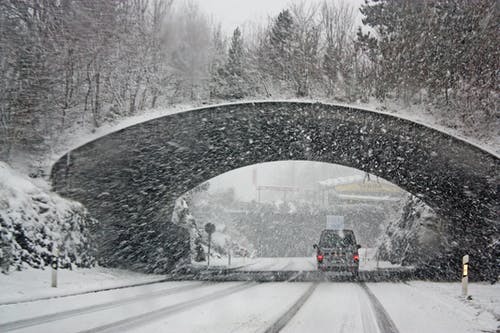
Our top tips for staying safe and on the road this winter.
It looks like it’s going to be a busy time for courier drivers and indeed HGV’s too this winter, boosted by locked down shoppers hitting the internet in a frenzy of online purchasing. But as winter sets in, you need to be prepared for potentially lots of rain, sleet, ice and snow, with freezing temperatures and high winds to boot. Whilst the odds of us having a ‘white Christmas’ are currently falling (unlike the snow!), even wet weather poses risks that need to be considered.
Just like Santa Claus we have made a list-and checked it twice- so here are our top tips for staying safe whatever the weather: –
- Check your battery is up to the task. With your heating turned up it will be working hard. You can prolong its life by turning your heating down once your nice and toasty and remember to switch off you lights, wipers and heater when the engine isn’t running. Nothing drains a better faster than all lights blazing.
- Have a pair of jump-leads in the vehicle in case you do get caught out. Plus, on the upside, at least you’ll be able to play the Good Samaritan and give someone else a jump start should the need arise.
- Talking of Lights- keep them clean and check bulbs are working, including indicators, reversing lights and brake lights.
- Check your oil levels regularly and top up your engine coolant, anti-freeze and screen wash.
- Check your tyres, including the spare (tread should ideally be at least 3mm). During an icy spell keep the pressure on the softer side for better grip. If you’re driving in regions prone to extreme cold,switch to winter tyres as they are made to grip better.
- Replace worn out wiper blades- they’re probably going to be working hard and nothing is more dangerous and annoying than smeared windows and squeaking wipers.
- Have a survival kit in the vehicle-just in case the worst happens. Things to include are
- Ice scraper
- Shovel – for digging yourself out!
- A hazard warning triangle
- Tow Rope
- Snacks, a Thermos flask of a hot drink, and water- maybe even the obligatory Yorkie bar?
- A torch and new batteries
- First aid kit
- Boots or wellies
- A fleece or warm spare jacket and gloves
- Tissues
- Your charged mobile and spare power-bank
- Spare de-icer, anti-freeze and windscreen wash
Planning is crucial
Whilst it can be argued that time is money and you may have deadlines to meet, keep yourself and other safe by slowing down in bad weather. Plan your route in advance and check that the sat Nav isnt’ taking over dangerous narrow bridges that may be blocked- have a plan B route as an alternative.
The Royal Society for the Prevention of Accidents (RoSPA) provide the following advice on road safety.
- Check weather conditions and listen to local bulletins, checking regularly as conditions can change rapidly.
- Try to be realistic about which journeys are essential and which could be postponed. Tell colleagues of your planned trip and timings so they can raise the alarm should something happen.
- Keep your tank full and have a spare canister of fuel.
- Always clear the windows completely of ice and snow and have your heater on full defrost before you set off.
- If your employer provides driver training, take advantage of it.
Be slow, be careful, be safe
Adapt your driving to the conditions, by slowing down and driving smoothly, as stopping distances increase on skiddy surfaces. Avoid hard braking, sharp steering and harsh acceleration. It’s advisable to de-accelerate and use your gears to slow down on icy roads and use brakes very gently.
Take bends and cornering more slowly than normal and leave bigger gaps between yourself and the vehicle in front. You may need up to TEN TIMES the normal distance for braking. Be aware that ice often accumulates in pocket for example under bridges.
Keep your vehicle well-ventilated, as hot cabs can quickly make you drowsy. Take more frequent stops, during which you should clean the windows, wheel arches, lights and numberplates.
Rain- reduces visibility and can make the road slippery, and your vehicle prone to aquaplaning. If this happens, ease off the accelerator and brakes until the tyres get their grip back. RoSPA recommend reducing stopping distances by up to half. Give yourself plenty of time and space for manoeuvres.
Floods- stay in the middle of the road as water tends to be deeper nearer the kerbs. If you do decide to try and get through the flood, drive slowly and keep your revs up to avoid stalling. Be aware of the bow waves caused by oncoming traffic. Conversely, given you are probably in a higher vehicle, be considerate to other road users and don’t flood them as you speed past! Test your brakes once you are out the other side.
Strong winds– avoid bridges and for high sided vehicle drivers- don’t go out!
Snow-If your van or lorry does get stuck in the snow, move slowly back and forward in the lowest gear, rather than revving the engine hard.
If you get stranded, stay calm and with your vehicle and call the emergency services on your mobile phone.
We hope these tips help to keep you safe this winter.
Don’t forget we are here to ensure that you have the most appropriate cover for your vehicle and your business.
